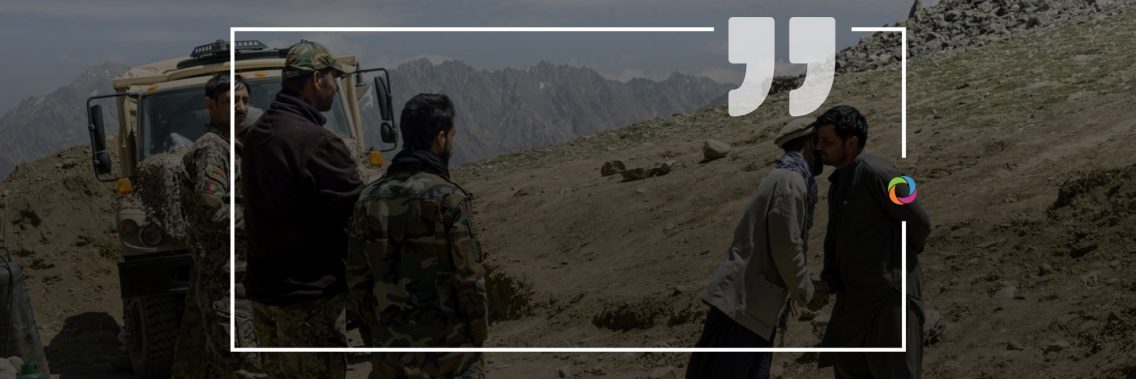The first statements made by the Taliban after taking back power in Afghanistan said that the armed group had changed but the Afghans who lived through the 1990s remember the Taliban’s strict rules and style of government. Only recently, teenage Afghan girls were not allowed to return to school as classrooms across the country reopened for the first time since the Taliban took power last month, raising fears that the new fundamentalist government will permanently ban secondary education for girls. We asked several experts to share their opinions in this regard.
Will the Taliban rule be different this time in Afghanistan?

“The Taliban regime announced its new interim government without a single woman being appointed to cabinet and a stay-at-home order for women civil servants, reminiscent of the old government regime of 1996-2001 back in power. The European Union (EU), United Kingdom (UK), and United States (US) accused them of failing to honor their vows to include different groups in government after they took over and will have a hard time persuading the current regime to be inclusive or follow rule of law. The addition of individuals in the United Nations (UN) sanctioned list and the FBI’s most-wanted list into the cabinet should probably have been an indication that the old Taliban is back and in control. The Taliban will most likely rely on China’s support to lobby its allies to fund the government, as the Chinese government has already provided money for aid, as well as, donated coronavirus vaccines, and in exchange, the Chinese government will probably have access to exploit Afghanistan resources including lithium deposits in the country. The future, however, looks bleak for the Taliban regime as they won’t have an easy time on the domestic front. With 20 years gains made by women, the women are more informed of their rights and will not go quietly into the night, even with the threats of violence, women have organized and protested against the new Taliban government. And with various factions within the Taliban jostling for control, some ember of resistance left, and looking for allies in the international system, the mounting pressure will make the Taliban regime appease some of the resistance, try to evolve, and stay in power or see itself disintegrate.”

“In front of the international community, the Taliban talk about renewal, hope, and change. But, as the days go by, it is clear that their old practices are gradually taking over. Promises have been made but, officially, this promised change is slow in coming. For example, the new government does not include any women. However, this time they are allowing women to go to school. But the conditions imposed to do so are so difficult that one wonders if this will not eventually cancel this permission. The introduction of single-sex classes, the compulsory wearing of the niqab, or the fact that only women or very old men will be allowed to teach women from now on is very restrictive. This moderate face that the Taliban wish to show could crumble and we would then return to the situation experienced during the first reign of the Taliban between 1996 and 2001. Unfortunately, there are still reprisals. Thus, many people are forced to live in hiding for fear of being killed or subjected to violence by the regime. In fact, many of the constraints are not official but are carried out unofficially with intimidation. For example, the ban on shaving beards and cutting hair like Westerners. In Afghanistan today, there is the reality on the ground of daily life and the face that the Taliban would like to present to the world. Thus, the Taliban spokesman did not hesitate to talk about wanting to establish good relations with the United States and other countries. He knows very well that in order to achieve this, the new government has to show proof. That is why under the ash that is an artificial peace, there is a fire that burns, a population that is bullied. The announced moderation leaves everyone doubtful.”

“When they ruled this country between 1996 and 2001, the Taliban imposed their ultra-rigorous version of Islamic law. Women could neither work nor study. Wearing the burqa was compulsory in public and they could not leave their homes unless accompanied by a mahram, a male chaperone of their family. Flogging and executions, including stoning for adultery, were perpetrated in town squares and in stadiums. On August 15, 2021, only a few hours after their arrival in the Afghan capital, the Taliban and their supporters were working to erase the image of women in the public space. Men were snatching images and portraits of women from the storefronts of beauty salons, making this one of their top targets in the Taliban doctrine. Those who, for twenty years, have gradually acquired rights have seen in a few hours, the new country masters reduce to nothing all the progress made. They fear that they will no longer be able to work or study and will be forced into marriage; some are even afraid for their lives. On the other hand, the attacks on Thursday, August 26 outside the Kabul airport gates have been claimed by the so-called Islamic State organization. A return to its establishment in this region and its links with the new country masters has led to at least 85 dead and 160 injured. Therefore, history is repeating itself.”

“Many people ask ‘will the Taliban be different this time in Afghanistan?’. My answer is unambiguously, ‘yes’, but not in a good way. Over the last twenty years, the Taliban has learned several key lessons. Firstly, when looking at the West’s response to human rights’ abuses in other countries, a clear pattern emerges. The West will not intervene if there is no threat to ‘international peace and security’ or ‘vital national security interests’. Secondly, harboring terrorist groups that do threaten the West’s interests may well provoke a response. Thirdly, and most critically, the Taliban have watched the rise of China, have understood the decline in the West, and have recognised that China will not intervene in human rights’ abuses but will intervene if China perceives the Taliban to be supporting Islamic extremists in China’s west. What the Taliban have taken from this is that they can do what they like with their own people and the West, and China will not intervene. But crossing an international border or harboring a group that threatens the West or China is a big ’no-no’. Hence the Taliban will impose their will on their own people but is unlikely to threaten the West. For the Afghani people, this is disastrous. There is one proviso though. What will the Taliban do with Pakistan? The Taliban can trace its roots well before the US invasion and well before the Soviet invasion. The Taliban’s roots go way back the creation of the Durand line (then the defect border between Afghanistan and British India). The Taliban is mainly ‘Pashtun’ and would like to see a united ‘Pashtunistan’. Pashtunistan runs from Kandahar, through Kabul into Peshawar – in Pakistan. So while some in Pakistan hail the Taliban takeover as a ‘victory’, I say, ‘be careful what you wish for’. The Taliban may well stay within the borders of Afghanistan for now, but at some point, they will turn their eyes to Peshawar, and then the Pakistanis may regret what they have supported.”

“First, we should understand the meaning of the word, different. If it means to adapt or obey democratic rules, respect different opinions, religions, and different genres as many western critics are hoping, I think we should forget this subject and the question. The Taliban will probably need the acceptance of the different tribes and govern the urban centers such as Kabul and Kandahar with an iron fist. It’s almost certain that they will try to emulate the Iranian ayatollah and its religious and political system. To behave and be accepted as a legal and established leadership of Afghanistan, they will accept help and contributions from different regional powers such as Russia, Iran, Turkey, Saudi Arabia, and Qatar and sometimes from western countries depending on their political needs.”
What leverage do Western countries hold over the Taliban?

“The Western countries influence over Afghanistan was over the moment the previous government fell. As it stands, it will be a herculean task to influence any policy within the Taliban regime as it performed an exorcist exercise of revenge killings, destruction of property, and beating of Afghani civilians who had previously worked for entities linked to the Western countries, a clear demonstration of its anti-West rhetoric and a deterrent of future associations. The only leverage that the Western countries have is to dangle the carrot in terms of resources but a difficult endeavor as western countries have already spent a lot of resources with little to no returns. Besides, the Taliban government won’t be relying on the West but on its allies like China and Russia to provide such support, a move both countries will probably welcome to cut any Western influence left in the country. Another full-scale war could be a likely scenario, but the most improbable of all scenarios as so much resource has been spent already. But the usage of targeted drone strikes could be leveraged against the Taliban government as it has been done in other countries. The other measure will be to sanction members of the Afghanistan government, some who are already on the UN’s sanction list, actions that are most likely not amount to anything substantive.”

“The American and European military presences in Afghanistan for several years have generally not been sufficient to bring stability to the country. It is therefore not surprising that the recent departure of American troops has led to an assault on the country by the Taliban. In the end, the various Western alliances and the funds deployed have not made it possible to pacify this bloodless country. We can note the weakness or the difficulty for the West to achieve its goals, namely to pacify this region. On the purely national political level, the eradication of poverty and inequality caused by the prevailing corruption has been a failure. Europeans and Americans have not been able to clean up the current government. As for international politics, the interference of countries such as Pakistan, China, and Russia are not unrelated to the weakening of the work of Western countries. However, the latter have a limited margin of maneuver on the relations of these countries with Afghanistan. In addition to the military aspect, we should also note the chaos caused by the drug trade which exacerbates the precariousness, the feverishness, and the tensions, first between drug traffickers and then between them and the rest of the population. Western leaders have shown themselves to be powerless in the face of the rise of this plague. Worse, the more they tried to reduce the drug culture, the higher the prices soared on the market. Yes, the influence of Western countries has a certain strength but it is not very effective. This is due to a shaky strategy and a lack of consideration for the political, cultural and sociological realities of Afghanistan.”

“Indeed, Afghanistan is a special country with a turbulent history of war and resistance to the invader, whether it be Britain in the 19th century, the Soviet Union at the end of the 20th century and, most recently, the United States at the head of an international coalition, for the last twenty years. A mainly mountainous country, Afghanistan is teeming with rare minerals valued to up to US$2,000 billion, according to an American study made about 10 years ago. China’s support for the Taliban is not dictated by the Taliban’s sole promise to prevent Daesh from disturbing the country’s security (given the presence of Chinese Uighur origin fighters in Afghanistan’s Islamic State organization), but also by the advantageous economic situation of Afghanistan. Indeed, China has a strong presence in Afghanistan in several economic fields, particularly in the exploitation of the copper mines south of Kabul. The international community has an ascendance on the Taliban due to the Taliban’s attitude. They want to get rid of the image they have been dragged out of a terrorist movement, made up of anti-progress, anti-women, and anti-Western Muslim fanatics. For them to govern, they need international recognition and they have wasted no time because they have already established relations with China, Russia, and Iran, to name a few. To their credit though, the Taliban have already expressed their desire to form an inclusive government with the participation of other components of the Afghan socio-political class. The United States and the European Union have also announced that any help or recognition to the Taliban regime will depend on how they treat citizens, especially women. In the end, the Taliban will have to respond to international pressure and comply with their main standards.”
See also | Will the Taliban rule be different this time in Afghanistan? | Experts’ Opinions (PART II)
Check out more than 40 job opportunities in the conflict sector here.

